#Payroll in France
Explore tagged Tumblr posts
Text
see a lot of people hyping up the terror and conclave for its miserable and pathetic old man representation, toxic workplace politics, and questionable workplace situationships but might i remind you WHO DID IT FIRST

#there’s a post on here that’s like old man yaoi in the most inhospitable place(the arctic the vatican)#add france to that list erik and daroga were lezzing out under the paris opera house and i have proof#and once again. erik was on that payroll it COUNTS#gaston leroux get behind me i will defend you#the terror#conclave#phantom of the opera
104 notes
·
View notes
Text
ᴄʜ. 3 ᴛʜᴇ ᴠɪꜱɪᴛ ᴀɴᴅ ʜɪꜱ ꜱʜɪʀᴛ.

Wattpad:lov3lybarista Pairing: Thomas Shelby x OC Warnings: rewrite of OG plot (had to use Lizzie sorry Liz I love her I swear) Word Count: 3.2k+ (this one is longer but worth it I promise) Masterlist. ↻ ◁ II ▷ ↺ Song: Six Pieces, Op. 51 By Tchaikovsky
March 17th, 1923, Arrow House, Birmingham, United Kingdom.
He hadn't been able to focus since they last spoke. It's like he had been damned by her voice, too gentle to constantly flow through his ears the way it did behind the quiet hours of the night and the chaos of the day. He sat with her file opened in front of him. He told himself it was for security, muttered over and over again to himself that it was just precaution, a simple box to tick, that a name like Dalia Hassan didn't appear on paper without shadows behind it, and if he was going to let her near his heart—figuratively….or otherwise—then he had the right to know about her.
But Thomas Shelby had never been good at lying to himself.
He had it all couriered in a plain file, typed clearly with no emotion in its pages.
Doctor Dalia Hassan. Foreign-born in Baghdad, Iraq. In the year 1897, if the records were correct. Her parents had died young—cholera or something more tragic, more painful. She was raised by a widowed grandfather, a former physician who taught her Arabic, Latin, French, and English with the names of bones before she ever learned to ride a bicycle.
She had resided in a house tucked against water, maybe the edge of something dangerous, rivers that could dry up during the heat of the summer and tainted with the blood from the nearby military base. When war had broken through Mesopotamia, she had the hands that could soothe soldiers that passed by, gentle enough to remind them of a mother's touch yet precise enough to take over when the accompanying physicians couldn't handle stitches narrow enough.
And then she fled—by foot, by train, by boat, by sheer fucking will. With her grandfather, and two older brothers who held too much weight on their shoulders and saw too much blood before they could learn how to spell words properly.
Scholarships took her through Instanbul, then Vienna, and then Paris. France—she was there at the same time he had fought.
Fuck, he thought, too close.
She was in England by 1919, the same year he had stepped off the train into Birmingham after the war had stolen whatever soul he had left.
Too close, he thought again.
She settled quietly, already established as a surgeon when most women had to bear the weight of a life in their womb, but she had managed to break through the cycle. No one had seen a woman like her before—let alone a doctor. Pale skin, yes. But those dark eyes, that black hair, and an accent that no one could quite place? She seemed to be a threat before she could even open her mouth.
She had no public affiliations, no fascist party alliances, no gentlemen patrons, no scandals, didn't smoke, didn't drink.
The only paper trail she led was multiple charities she funded or donated to—orphanages, women's sanctuaries, veteran's protection, immigrant help.
She wasn't supposed to be here, not in this field, not in this position of unmatched quiet power, alone, unmarried, a woman. He had her entire history in front of him yet he still couldn't quite believe it.
And when the call finally came through—from a quiet maid loyal to his aunt Polly who had found a rotation in her estate, now with the Shelby pound in her pocket, he finally got his answer to the itch that had found his neck ever since she answered the last call a little too breathless and a little too intimately.
It wasn't really about the man, not completely. It was about the fact that someone else had gotten to see her like that—the Dalia who he had only seen in his dreams: undone, needy, panting.
The maid on his payroll had delivered the report quietly, clean, mundane, and so ordinary that he had to replay it in his head three times and still couldn't believe it. A single visitor, no ties, nothing political, nothing romantic. Quiet, in the early hours. Left before sunrise.
He should've felt relief, but instead, he only felt the burn of something sharp—sharp and sick and unfamiliar creeping between his ribs and leaking into his tainted heart.
Jealousy.
Jealousy so cold and viscous it came dressed like possession—and something else he didn't want to name.
Obsession.
Friday evening, Betting shop in Birmingham, United Kingdom.
The call came just as promised, sharp on the dot of when the clock had struck 6 p.m.
The sun began to dip low behind the city skyline, his office had been soaked in the glow of golden firelight, the smoke of his cigar coating the space between his eyes and the telephone as he glared at it as if it would summon her.
He answered on the first ring.
"Hello Mr. Shelby," her voice was that smooth professional tone again, not necessarily cold, but distant enough that it gave away nothing. It was like listening to silk stretch over steel, soft enough to carry the undertone of her accent through his name.
She spoke like nothing had happened, like she hadn't picked up his call wrapped in bedsheets and someone else's breath fanning on her neck just a week before.
"Are you following my instructions?"
He leaned back in his chair at her question, his hand rubbing his jaw as he stared at the ash in the tray in front of him.
"I drank the citrus water," he began, "told the chef to make the kale disappear. Took all those pills." He paused. "No strong alcohol since Monday morning."
"A miracle," she muttered, "what about your chest?" she asked, "Any pain?"
He sighed, his hand dropping to his chest like he could rub away the ache, "Only when I think."
She lets out a soft breath—maybe a smile?
"Are you still tense?"
"Wouldn't be me otherwise."
He waited through the silence that followed, watching the smoke rise and disappear.
"Your voice is steadier this week," she said softly, "Less strained. You sound better."
"You sound different." He replied.
She hesitated just enough to confirm everything he needed to know.
"I'm calling from the clinic."
It wasn't the location that mattered, it was the tone, the lack of that rasp of passion she had carried that made the ache pull tighter in his chest. No breathless distraction, no man murmuring her name behind her through the crackle of the line static.
He pinched the bridge of his nose as he leaned forward, his elbow pressed against his knee, "Why'd you answer last week?"
"You called me."
"Didn't sound like a good time." He countered.
"it wasn't," she agreed, no shame. "But I answered because I knew it was you."
That silenced him again, and it settled between them, alive and electric. He didn't know what to say so instead he asked:
"Still want me alive, then?"
"Yes," she mumbles, amused, "I wouldn't be calling if I didn't. Alive, well, better."
"You're asking for a lot," he says back, barely above a breath.
"You're worth a lot," she said it like it was the simplest truth in the world.
His chest ached again in a way that had nothing to do with stress or disease or any intoxicant.
"You'll be around next week then?" he asked, though the words sounded forced through his throat, "to check up instead of call," he added like it would make the need in his tone sound any better.
"Yes," she agrees—and then, gently, softly, like the impending night itself was listening, "would you even let me leave when I visit?"
He didn't answer because they both already knew.
The following week, Gin Factory, Birmingham, United Kingdom.
Lizzie didn't like the silence that had settled recently. Thomas was too on edge, too numbly excited for a secret doctor that no one knew about. He'd mention her in passing, a small murmur passed through the smoke of the cigarette he held between his lips but he waited for her calls like there was something worth being said between them.
And yet—when the sound of her heels came in, sharp and measured, Lizzie suddenly wished for the silence to reappear so she could scorch her out of her mind.
She glanced up and stopped cold. A woman in a deep red dress—the kind of color that made blood seem insignificant—moved down the corridor like she didn't care about how out of place she was, that the factory was a mere backdrop to her existence. The dress was long, modest enough to be long-sleeved but clung to her like it was her skin but more…sinful. Her black hair was tied back, pinned perfectly in a low bun, like a rested raven's wing against the pale nape of her neck. Gold glinted against her skin, her ears, the hollow of her throat, delicate enough to remain classy but polished enough to show that it was expensive.
And in her hand was a medical bag so elegant it could be deemed as the century's next fashion statement, buttery black leather and gold hardware.
That's her, she thought. And she hated that she knew who she was without needing to be told. Lizzie stood urgently, suddenly too aware of the wrinkle in her dress and the short chop of her hair.
"Dr. Hassan," she spoke, voice too tight to be polite.
Dalia turned her head gently, and an elegant yet bearly-there smile painted her red lips—the kind of red that didn't scream but smoldered.
"You must be Lizzie," her voice spoke out, calm, precise, unhurried.
Lizzie almost cursed out loud.
"He's expecting you," she responded, "Didn't want the trouble of going to the clinic?"
"No," Dalia replied smoothly, "Thought I'd come to him. I know men are much more honest when they're at ease."
Without waiting, she turned, her perfume lingering behind her like a curse against her very bloodline—a whisper of something dark, elegant, outright too feminine to reside in this factory. Fig, amber, something more intimate that didn't fade.
Thomas cursed under his breath when she entered. He sat behind his desk, jacket scruffed off long ago, his sleeves rolled up. The window behind him framed the city in a greyish-blue haze that made her stand out even more.
Something in him shifted. It wasn't surprise, not quite that. Not relief—no. Something far more dangerous.
She stepped into the office like it was her own, no knock, just the click of the door melting into the sound of her heels. The red of her dress glowed like a torch lit to signal danger and danger she was.
He stood instantly, his strides long and almost too quick, "You came."
"I thought your medical neglect could be delivered more successfully in person," she said, her eyebrow raising as the warmth of his large hand settled on her lower back, guiding her to the chair in front of his desk.
He said nothing, just stared down at her as she sat, his chest rising too deeply for the calm facade he tried to put up around her. There it was again, that scent that made his eyes flutter shut a second too long as he blinked down at her.
"Drink?" he asked, his voice low.
"Water please."
Of course, he thought, a light smile curling his lips.
He came back with the crystal glass feeling too heavy in his hand, his pulse fluttering when the warmth of her delicate fingers took it from him. He leaned against the edge of his desk with his arms crossed, watching her as she took a small sip, the stain of her lipstick against the rim made his jaw clench.
And then—of course, it had to happen—Lizzie came in. The door sprang open with a knock too quiet to mean anything, and she stepped in without waiting for an answer.
"Sorry," she lied, her voice falsely sweet. "I didn't want to interrupt, but I need a signature on the Irish paperwork. Couldn't wait."
Thomas licked his lips slowly, "It could've." he said.
She ignored him, her eyes swiped over to Dalia who sat too poised in the chair that was too close to him, her hands folded neatly in her lap like a ballerina about to rehearse. Lizzie walked to Thomas with a smile and a sway that gave away much more than he wanted.
She touched his shoulder, smoothing down the fabric, "What do you think of his shirts?" she asked, her eyes flicking back to the doctor, "Had them custom made in London."
Dalia said nothing for a moment, a single dark perfect eyebrow raising as she took in Thomas with a look that made him pull away from Lizzie's touch. It felt like she was touching him with her eyelashes—down his torso, across his chest, his shoulders, the Adam's apple of his throat that bobbed as he tried to coat his suddenly dry vocal cords.
"It's…nice," she finally said, her voice unbothered enough to make Lizzie inhale sharply, "But I know a tailor who trained under the best in Paris. If you'd like something with a more flattering silhouette, I'll gladly pass along the name."
Thomas shifted, pausing the wince that swept across his mouth. He wanted to look away, anywhere but between them. Lizzie's smile froze, her bottom lip caught between her teeth.
But what she did next stung more.
Dalia reached into her bag, uncapping a pen, and began to write. Not dramatically, just eloquently into a crisp checkbook.
"I've been meaning to speak to you," she said, her voice directed to Thomas, but clear enough for Lizzie to hear, "about your Gray-Shelby Foundation. Noble cause," she murmured, her eyes flicking up to meet his as she placed the check on the desk, "I want to donate."
She regarded him with an amused, almost lazy look like she couldn't believe she was entertaining something so petty.
"I'll leave it blank. I trust your judgment."
Her eyes went back to Lizzie who was staring at her like she wanted to stab her or just plainly shoot.
"And Lizzie, is it?" that only hardened the blow, "You can run it down to accounting to get it processed. Please and thank you."
Lizzie couldn't find the words, not immediately.
But then, Dalia spoke again, standing up as she set her medical bag on his desk, turning to Thomas:
"Well," she began, her voice deliberate, "how about we start the examination and see what ache lies under that nice shirt?"
Lizzie stood frozen in her spot, and Thomas, well, Thomas didn't breathe.
She only smiled—like the room had gone exactly how she had wanted it to.
The door slammed shut when Lizzie left, and he would have offered an apology that he rarely gave except she had only shook her head with a dismissive smile.
And so Thomas dropped it. He motioned to the leather couch in front of the fireplace mantle, a spot reserved for the meetings he wanted to keep off the books. She moved with that swanlike manner she seemed to permanently hold, and he slowly began to shed as he followed her, his eyes holding a heat much higher than whatever fire burned to keep the room warm.
He sat down next to her, and she shifted closer, her hands already seeking the bare skin of his broad chest. The stethoscope was placed in the center, her other hand steading herself—or maybe him—on his shoulder blade.
"Breathe in," she said, her breath too close to his skin, "your heartbeat is faster than it should be."
He huffed out a laugh. "I wonder why."
She didn't answer, just moved the stethoscope lower, and her hand moved now to rest flat against the center of his chest.
"Do you feel the pressure here?" she whispered.
He didn't answer right away, his hand rose slowly, and the tips of his fingers brushed against her wrist where her hand sprawled, "I feel you."
And then for the first time since she entered she froze. Just a split second, but it was enough. Enough for him.
"Behave yourself," she scolds, though her tone held no restraint.
His mouth curved, slow and dangerous, she didn't pull away her hand. The heat of her breath continued to slide down his throat as she finished the rest of the examination in silence, his eyes never straying from her porcelain face. When she finally pulled back, he gripped the edge of the couch to stop himself from dragging her into his lap.
She stood, her things collected, her hands smoothing down the dress around her hips, and she looked at him again with that same devastating composure.
"I recommend rest, though I know you won't take it."
He sat there, bare-chested and his throat dry.
"I'll order bloodwork," she said, "maybe in two weeks. Don't worry, you'll feel much worse before you feel better.
He grinned, his eyebrow raising, "That a promise, doctor?"
She paused, her hand at the door, her eyes dark as she glanced over her shoulder at him.
"No," she spoke, "that's a warning."
And then she left, the red fabric of her dress trailing behind her like a match strike.
Thomas pried himself off of the couch, his hand reaching for his shirt with a too-heavy ache settled deep in his bones. The air in the office was thick, left behind with the scent she trailed, of warm skin and something too unique to name, the same smell that lingered on his collar every time she disappeared.
He buttoned his shirt with fingers that didn't move as steadily as they always had before her. By the third button, he was already pissed. He didn't bother with the top two. Didn't reach for his vest or his jacket. He just threw the office door open and stepped out to where Lizzie sat at her desk, shuffling through papers too loudly.
"Lizzie."
She shot her eyes up at him. The tightness in his jaw had said enough, but his walk screamed louder.
"What the fuck was that earlier?" he asked, voice low enough to show he was on the edge of control.
"What do you mean?" she replied, blinking through feigned innocence.
He stopped in front of the desk, his collar unbuttoned, his skin still warm from where she had touched him just minutes ago.
"You interrupted a medical consultation to ask her opinion on my shirt."
Lizzie just shrugged too quickly, "She didn't seem to mind."
Thomas scoffed, stepping closer, "You were trying to provoke her. She didn't give, now you sit here like I've killed someone just by having her here."
Lizzie scoffed back, "Why? Because she thinks she's so untouchable? Because she walks around like she invented silk and restraint?"
Thomas's teeth ground together, barely holding himself still.
"You don't think I see it? The way you look when she talks to you like you're waiting for her to tell you how to feel?"
And when his silence said too much she huffed and let out a laugh that held no humor, "She's just a doctor, Tommy. That's all she is."
Thomas looked at her. Not cruel, not cold nor was it tender. Just final.
"She's not just anything."
And with that, he walked back into his office, sleeves still rolled up and shirt undone at his collar with the ghost of Dalia's touch still burning against his nerves.
Lizzie sat there, blinking back tears as she finally realized she had already lost a game she didn't even know they had been playing.
#thomas shelby x reader#thomas shelby x you#thomas shelby x imagine#thomas shelby x y/n#cillian fic#thomas shelby#thomas shelby fanfic#peaky blinders fanfiction#peaky blinder fanfic#tommy shelby imagine#thomas shelby x oc#thomas shelby smut#cillian murphy#cillian murphy fanfiction#cillian murphy imagine#cillian murphy x oc#cillian murphy x y/n
41 notes
·
View notes
Text
Run, pretty girl, run Chapter 6
Summary: Even with the safeguards put in place after the fall of S.H.I.E.L.D., the remaining Avengers find themselves on the run after the American government falls into disarray. The code word is sent, and they’re officially fugitives. Bucky makes a run for the safe house set up for emergencies like this where the Avengers are told to meet up, but on the way saves the pregnant agent turned payroll specialist that he was partnered with. Will they make it before she goes into labor? Or at all?
Warnings: violence, pregnancy, childbirth, death of minor character, language, eventual smut
“Бегать”: run “Подтвердить” : confirmed “Enkosi”: thank you “Дома”: home “Добро пожаловать”: welcome
Previous chapter Next chapter
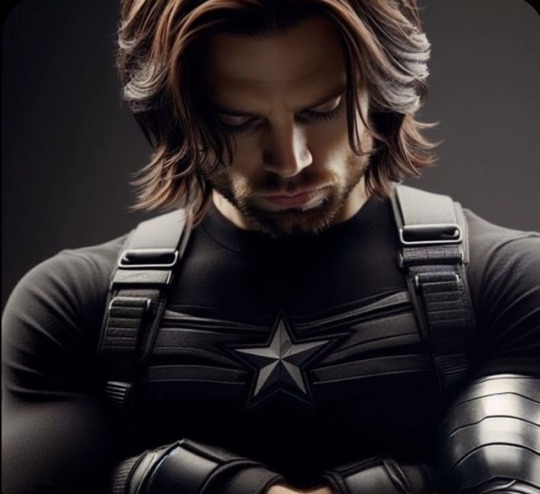
Once they got back to the Avengers compound Y/N kept good on her threat and retired. She had had enough, and losing her baby was the straw that broke the camel’s back. Fury made sure that a hefty restitution was paid to her as a last ditch effort of goodwill. Bucky followed her lead, though his retirement was much more of a headache, being an enhanced person who was on the main team of the Avengers. As he finally finished his outgoing paperwork and he and Y/N got paid out on their pensions, he booked flights and got things in place for them.
“You all packed, pretty girl?” he asked a few weeks later.
“Yep. Though I wish you’d tell me where we’re going,” Y/N said, giving him a hesitant look.
“Don’t worry about it, Mamas,” he reassured her, kissing her cheek. “You’re gonna love it.”
A few hours later they were on a plane, graciously provided by Stark Industries from Pepper. Y/N relaxed against the large seat, her eyes fluttering shut as Bucky held her hand. She had stopped bleeding from after childbirth, and her body was finally feeling better after all they’d gone through. They hadn’t done anything more than kissing, which Bucky was fine with. He was inexperienced after 70 some years under Hydra, and as much as he wanted her, he knew it would take time and healing before either of them might be ready. That being said, as they got further and further away from the Avengers, the more relaxed and flirty she seemed.
On their descent Y/N became more jittery, trying to look out the window and see where they were. “Uh uh, no peeking,” Bucky admonished her, taking her chin between his metal fingers and making her look at him. He winked at her when she met his gaze and she bashfully smiled, blushing and looking away.
“Come on, Buck, the suspense is killing me,” she whined.
“Soon, Mamas, soon,” he murmured, grabbing her hand and kissing the back of it.
They landed and Bucky blindfolded her before they walked off, leading her carefully to an awaiting car that was quickly loaded with their luggage. As the driver took them to their destination she never let go of his hand, squeezing it tightly in anticipation. The car stopped and Bucky helped her out while the driver unloaded their bags and promptly drove off.
“Okay, it’s driving me nuts, where are we?” Y/N demanded.
Bucky chuckled as he started untying the blindfold. “You,” he paused, kissing her ear and she gasped, “me,” he kissed her neck, “and a cocktail in Monaco,” he finished, kissing her shoulder and pulling the blindfold off. Y/N blinked rapidly as she got used to the sun in her eyes, then looked up and gasped again. They stood in front of a French villa that faced the neighboring sea. The sun was setting, creating a rainbow collage that made the white walls of the villa look like they were glowing. The borders of the house were covered in flower gardens and walking paths that circled around the back. She looked around in shock and turned to face him. “Well, technically Nice, France,” he said. “But we’re taking a boat tour of Monaco tomorrow.”
Y/N squealed and jumped into his arms, hugging him tight around the neck. “This is amazing, Bucky,” she said reverently as she pulled away and looked at him. “We made it,” she whispered, leaning her forehead against his forehead.
“We made it,” he agreed, leaning in and kissing her lightly. He led her inside and they took a tour of the house and grounds, watching the last bit of sunset before going inside and getting unpacked and settled for the night. As he lay down in the bed of the main bedroom he sighed loudly, Y/N smiling at him as she exited the adjoining bathroom. “I’m so tired,” he breathed. “Long flights really take it out of me now. My age is catching up with me,” he smirked at her.
Y/N huffed a laugh. “Well, if it’s any consolation, you look incredible for 107,” she teased, laying down next to him, propped up on her elbow.
Bucky laughed, turning to face her. “Oh really?” he asked, cocking an eyebrow.
“Oh yes,” she said, reaching out and tracing the tip of her finger down his nose. “You live up to your name, hot stuff.”
Bucky blushed and fought an oncoming smile. “Big words from the prettiest girl,” he retorted.
Y/N rolled her eyes. “I don’t know about prettiest,” she said.
Bucky scoffed. “You are,” he said earnestly. He took her hand and started kissing it all over the back of her hand to her knuckles to her fingers. “My pretty girl,” he mumbled into her palm. He started kissing up her wrist to her arm, continuing to pepper featherlight kisses up to her shoulder and into the crook of her neck, making her lay back as he hovered over her, his metal hand gripping her hip. Y/N sighed as he worshiped her skin, her fingers gripping the blankets beneath her.
As he sucked on a sensitive spot he found weeks earlier near her ear she moaned. “God, Bucky…” she breathed.
He smiled against her jaw. “Yes?” he asked.
She reached up and ran her fingers through his hair, tugging at the strands and making him inhale sharply. “I’m still waiting on that cocktail,” she murmured in a teasing tone.
Bucky laughed into her neck as she shook with laughter under him. “Whatever my pretty girl wants,” he murmured, nipping at her earlobe, making her squeal. “Though I can’t promise I’ll be any good at it.”
“Have you never made a cocktail before?” Y/N asked, looking at him in surprise.
Bucky grimaced. “Uh….no?”
She rolled her eyes and pushed him off of her. “Okay, let’s go,” she grunted as she stood up from the bed and headed out the room.
Bucky quickly followed her out to the kitchen where a bar was nearby facing the view of the ocean. Y/N walked behind the bar and started rummaging through the small drink fridge, pulling out different bottles. She pulled out two glasses from the wall and loaded some ice into them before turning back to the bottles. “Have you ever had an Aperol Spritz?” she asked.
“No,” he said, watching her intently.
Y/N smirked as she started showing him what to do. Bucky loved watching her hands confidently grabbing the bottles and pouring them, adding the bitters and mixing everything together. She finished with a slice of an orange in each glass then handed it to him. “You, me, and a cocktail in Monaco,” she said, holding up her glass.
Bucky smiled. “Saluti,” he said, clinking his glass against hers. Y/N smiled and sipped her drink while he took his first drink. He hummed as the taste slipped across his tongue, his eyes narrowing at the drink. “Wow, that’s…that’s really nice,” he said.
“Right?” she said, her smile widening.
“You’re really good at this,” he said. “Where did you learn to make drinks?”
“Well I wouldn’t say an Aperol Spritz is hard,” she scoffed. “But, funny story, I was undercover for a while before being partnered up with you,” she said, putting her drink down and lifting herself up onto the counter of the bar to sit. “I was gathering intel on a nationalist group that was trying to partner with the Flag Smashers after the Blip,” she continued, taking another sip. “Thankfully, people like Karli Morgenthau were at least sensible enough to not want to associate with racists,” she cocked an eyebrow at him. Bucky huffed, nodding as he remembered Karli and the Flag Smashers that he and Sam fought with a few years ago. “I worked as a bartender in the bar the nationalists met at,” she said. “Had to blend in. Most of the drinks were easy, but for the odd cocktail every once in a while I had to look like I knew what I was doing, so I was trained in making drinks.”
“How did that mission end?” he asked.
“Oh, I just gave over intel and washed my hands of it when it was over,” Y/N said, downing the rest of the drink. “I heard that it was a quick clean up.”
“Good,” Bucky smirked. “What were you doing until we got partnered up?”
“Small missions,” she shrugged. “That’s unfortunately how I met Tim.” Bucky’s mouth tightened at the mention of the disappearing baby daddy. Y/N looked down, her hands gripping the counter. She was quiet for a moment, and Bucky quickly downed his drink before stepping toward her and between her legs. He ran his hands from her wrists to her shoulders then up to her neck, his fingers under her jaw making her lift her head up to look at him. She looked sad as she gazed up at him. “I thought he loved me, you know?” she whispered. Bucky nodded. “He was really intimidated by me working with the Avengers,” she continued, a small lopsided smile breaking through. “Especially working with you.”
Bucky scoffed. “Really?” he asked.
“Yeah,” she nodded. “He didn’t like how well we partnered together.”
Bucky couldn’t help but smile widely. “How insecure,” he murmured, his thumbs tracing along her jaw.
“Though I guess he wasn’t wrong,” she ventured, narrowing her eyes at him.
“Why do you say that?” he asked, leaning forward and rubbing his nose along her nose.
“Because we’re here,” Y/N whispered, her hands leaving the counter to reach forward and grip his shirt. “And he’s not.”
Bucky kissed the tip of her nose and started rubbing his nose and lips across different parts of her face. “Do you remember how after he left, I was so angry,” he muttered, slotting his hips between hers and against the counter further, “and I disappeared for a few hours?” Y/N nodded, her hands moving up from his stomach to his chest. “He never made it out of the state,” he said, a bitter tone to his voice as he tilted her head and his lips skimmed along her cheek to her earlobe, continuing what he was doing earlier.
“What did you do?” she whispered.
“You don’t wanna know,” he whispered, then licked her neck up to her ear, and she squirmed and moaned into his ear. “You like that, Mamas?” he said. “You like that I would do anything for you? That I would kill for you? That I’ve wanted you since the moment I laid eyes on you?” Her breath stuttered at that revelation. “That even though I had a hard time trusting people, I knew I could trust you…with my life, my love, my heart? That I’ve loved you since our first mission together, and you patched me up so tenderly?”
Y/N sniffled and he pulled back. Her face was a look of desire, but there were tears streaming out the sides of her eyes. “Yes,” she groaned. “Yes, I like that.”
Bucky bit back a shit-eating grin. “What do you want, pretty girl?”
“You,” she sighed. “I want you. All over me. All around me. Please, love,” she begged, which made Bucky’s brow furrow and his jaw tighten. “I love you,” she whispered, wrapping her arms around his neck and pulling him down.
Just before their lips met he groaned. “I love you,” he murmured, then kissed her hard.
Y/N damn near climbed him like a tree, pushing herself up off the counter and into his arms, wrapping her legs around his waist as one of her hands gripped the hair at the back of his head and tugged while licking along his lower lip. Bucky whimpered as he turned and carried her back to the bedroom, his fingers digging into her hips. When he finally got back to the bed he set her on it without breaking apart, sliding her up the bed until he was able to start to thrust against her hips, dry humping into her as his hands slid up her sides, pausing near her breasts.
“Please, Buck,” she said, removing her hands from him and reaching down to start pulling her shirt off.
Bucky gasped as she revealed herself to him. He had seen her breasts from their awkward mastitis encounter before, but getting to see them in this way was completely different. “So pretty, Mamas,” he moaned before dipping his head down and licking at her nipple. Her back arched, pushing her breast up into his mouth, and he sucked at her nipple fervently as his fingers played with the other one. Y/N took off his shirt next, hastily pulling it up and over his head and flinging it across the room. Her hands then massaged over him from his shoulders, down his arms and across his chest. As he switched his mouth to her other nipple she lifted her head up and started kissing along the wound that connected his metal arm to his body. It made him shudder, releasing her nipple as he gasped against her skin.
“Fuck, Y/N,” he breathed. “So sweet to me.” His fingers traveled down to her hips, pulling at the hem of her shorts and underwear and looking up at her. She nodded and he pulled them off down her legs. She was already wet, her pussy glistening as he stared down at her. “Goddamn,” he muttered. “Can I taste you, Mamas? Please?”
“Yes, please,” she replied, spreading her legs further apart.
Bucky smiled and positioned himself to lay down between her legs. He hooked her thighs around his arms as he kissed her inner thighs up to the crease between her leg and her pussy lips. He gave her a broad-tongue lick up her slit, making her gasp loudly. Bucky hadn’t done this in a very long time, but he followed his instincts and did what felt good, watching her reactions and noting what made her squirm more. Her fingers grasped his hair, holding his head against her as he ate her out with desperation. Y/N’s legs began to shake as he sucked hard on her clit before releasing it with a loud slurping sound. As he gazed up at her he noticed the scar near her navel where the doctors had removed her baby. He moved his head up and kissed it tenderly. She stiffened at his actions, her fingers relaxing in his hair and scratching his scalp gently. He kissed along the entire scar before kissing back down to her clit. Y/N looked down at him, the tears returning at his tenderness. He returned to licking her clit, this time not as desperate or frenzied, but more intentional and purposeful. Within moments she threw her head back and moaned as she came, her hips jerking against his face as he helped her ride through her first orgasm. “Good girl,” he said, licking up her cum.
Bucky lifted himself back up and moved to hover over her, dipping his head down and kissing her. Y/N moaned at the taste of herself on his lips, her hands reaching down to start pushing his pants down. Bucky pulled away and watched her eagerly slip her fingers past the top of his boxers and dip down to grip his cock. He lightly gasped at how her hand felt wrapped around him, his hips jerking against her. “You gonna make me feel good, hot stuff?” she teased, giving him a wry smile.
Bucky nodded, his mouth agape as she gave his cock lazy pumps with her hand. He quickly slipped his pants and boxers off then reached for something in his pants pocket. “Let’s be sensible about this,” he muttered, pulling out a condom. He opened it and rolled it on himself as Y/N stared down at his cock. “Even though I’d love for you to have my babies,” he teased back as he settled between her legs again.
Y/N looked shocked at his words, but a small smile lit up her face. “You wanna have babies…with me?” she asked.
“Of course I do,” Bucky said incredulously. He gripped his cock in his metal hand and slowly rubbed it between her lower lips, coating himself in her cum, making her shiver. “I want it all with you.” He aimed himself at her entrance and slowly started to push in. She moaned at the stretch he gave her, her hands gripping onto his shoulders. He kept going until he was fully seated inside her, his hips fully flushed with her hips. He sighed heavily as she enveloped him, her grip loosening on his shoulders and her hands smoothing down his arms. “I want you to be my girlfriend,” he said, leaning down to kiss her cheek as he gave her time to adjust to him. “I want to make you my wife,” he continued, kissing her other cheek. Y/N hummed as he kissed the tip of her nose. “I want you to have my babies,” he smiled. “I want to live the rest of my life with you. All I want is you, pretty girl,” he smiled, kissing her lips.
Y/N wrapped her legs around his hips, squirming against him. “I’m all yours, Bucky,” she said. “All I want is you.”
Bucky couldn’t stop smiling. He pulled his hips back and then thrust back into her. Y/N’s mouth dropped open in a silent moan. “Mine,” he moaned as he continued to slowly thrust back and forth.
Y/N’s hands moved back up his arms, shoulders, along his neck until she was cupping his face. She brought him close to her face and rubbed her nose along his. “Mine,” she said.
They both smiled at each other as Bucky kissed her again, his hips never stopping. His pace picked up speed as he dug an arm under her neck to hold her closer, his kisses moving from her mouth to her neck, nibbling along her throat to her ear. Y/N’s nails scratched down his back, making him snap his hips harder into her and she moaned loudly. “Fuck yes!” she yelped. “Do that again!”
Bucky huffed a laugh against her cheek. “You like it hard, Mamas?” he asked, giving her another snap. Y/N squeaked, her eyes shut tight and nodded frantically.
“Yeah…please Buck…hard and fast…just keep calling me that,” she said, opening her eyes and looking down between them where they met.
“Oh really?” he teased, pulling out until only the tip of his cock was inside her. She looked up at him in annoyance, her hips wriggling to try to make him push back in. “You like being called my pretty girl?” he asked. Y/N nodded, her face scrunching up with desire. “Or do you like Mamas better?” he asked, giving her a quick snap of his hips.
She shrieked, her fingers scratching him harder. “Shit! Bucky please…”
“Answer me, Y/N,” he instructed, nipping at her lower lip and sucking on it.
Y/N was nearly shaking beneath him. “Mamas,” she whispered, licking at his mouth that was still holding her lip.
Bucky smirked as he released her lip. “I knew it,” he chuckled. He braced his knees more on the bed then started pounding into her at a frenzied pace. Y/N gasped, her head wrenching back against the bed. Her breaths and moans came out faster and more high pitched, her arms wrapping around his back. Bucky kept himself close to her, wanting to feel her skin against his as much as possible. “I’m close, Mamas…fuck,” he groaned. “You gonna cum for me again?” Y/N nodded, biting her lip as she looked up at him. “Shit, you can’t look at me like that,” he moaned, closing his eyes.
Y/N’s fingers scratched up his back again then around his sides to his chest, up his neck and then tangled into his hair, scratching his scalp. “Let me see those pretty eyes, hot stuff,” she murmured, her voice coming out airy and seductive. Bucky opened his eyes, his breathing getting heavier as he looked down at her. His hips started to roll against hers, and it made her eyes slightly roll as she swallowed harshly. “I love you,” she breathed, then kissed him like she’d never kissed him before.
Bucky whimpered, his metal hand sneaking between them and his middle finger flicking her clit fast. “I love you,” he mumbled against her lips. Y/N whimpered, then her orgasm crashed over her. She stiffened, her legs locking behind him, her fingers ripping at his hair as she came with a muffled scream against his lips. Bucky grunted as her pussy clamped down on him, and within two more rolls of his hips he was cumming, a long, deep groan reverberating in his chest.
They panted against each other as they came down from their highs, Bucky dropping his head into the crook of her neck, lazily kissing her collarbone. “Goddamn, Mamas,” he mumbled. Y/N giggled, her legs starting to relax and release him. “You’re so good,” he continued. “Feel so good…god I love you…”
Y/N softly ran her fingers through his hair as he lifted his head to look at her. She had a lazy smile on her face, her eyelids half drooped as she breathed deeply and looked up at him. “Heya hot stuff,” she muttered.
Bucky smiled. “Hey pretty girl,” he said.
Y/N sighed. “Thank you,” she breathed.
“For what?” he asked.
“For this,” she replied, cupping his face in her hands. “For taking me here. For doing all you could to keep me and Grant safe. For being my partner, my best friend,” she said, her thumbs swiping across his cheeks. “For loving me. Thank you for everything.”
Bucky shook his head with a small smile. “And I’d do it a million times over,” he said, kissing the tip of her nose. “Anything for you, Mamas.”
@vioplay19 @mrsnikstan @scott-loki-barnes @tufflepuff23 @itsmytimetoodream
#marvel#smut#bucky barnes#bucky barnes fanfic#bucky barnes x reader#series fanfic#chapter 6#pregnant!reader#mama reader#agent reader
69 notes
·
View notes
Text
Watching The Amateur in theaters rn and I just love Rami Malek. Predictable movie premise and akin to Dylan O’Brien’s American Assassin. It’s like if Mr. Robot quit drugs, got married, and became part of the CIA’s payroll. A nerdy pathetic John Wick idc. Rami’s got the saddest eyes and sluttiest waist just perpetually typecasted for pitifully traumatized roles. Oh Rami Malek, you are everything that wannabe Harry Styles could only dream of becoming. Several scenes take place in France which is fitting because Jon Bernthal’s casted as well and you know what that means. Eiffel Tower baby!!! Anyway I took a bathroom break just to post this goodbye.
22 notes
·
View notes
Text

This payroll guy at Nixon Nitration managed to steal $6000 from them, close to the equivalent of $100k in todays money. Fun story. War widow from Jersey City made him do it as she blackmailed him and somehow it's not relevant for what but relevant we know her husband was an officer killed in an auto accident in France.
Went on for years and nobody noticed. Yet they're trying to get every dime out of used barrels, cows, cars, engines etc at the plant.
7 notes
·
View notes
Text
Presidential advisor Elon Musk recently claimed on Joe Rogan’s podcast that Social Security is “the biggest Ponzi scheme of all time.” In fact, Social Security has been one of the most effective and enduring components of America’s social safety net. It has done more than almost anything else to alleviate the problem of poverty amongst the elderly. While the program has been far from perfect, Congress has continued to improve and strengthen its structure over time when reforms were warranted. The program has become a “third rail” in national politics because it is so central to the lives of families living in states both red and blue.
Until recently, President Donald Trump has known enough to stay away from this issue. He has avoided mentioning cuts to the program, most likely sensitive to the fact that doing so has very little appeal to most of the electorate, including with a lot of the voters who brought him into power.
But as with his drive to reshape the government workforce with a sledgehammer rather than a chisel, Musk might end up dragging the president into a political quagmire that will consume much of the administration’s energy. Threatening Social Security, which turns 90 this year, will do more than almost anything else to energize Democrats and deflate Republicans, who will perceive this to be a losing issue for their party.
President Franklin D. Roosevelt and the Democratic Congress created Social Security in 1935 at the height of the New Deal. The United States had yet not adopted the kind of federal social insurance programs for retirees that European nations had put into place decades earlier, like Germany (1889) and Denmark (1891). In 1934, the Committee on Economic Security, headed by Secretary of Labor Frances Perkins, proposed that Congress create a federal insurance program that would provide retirees with pensions financed through payroll taxes.
Crucially, the program would be universal, including all workers who whose jobs were covered rather than deciding who should receive benefits through a means test. The belief of the program’s founders was that within a nation historically ambivalent about federal programs, means tests stigmatized beneficiaries whereas universal benefits were not seen as handouts. Universal benefits also had the advantage of investing many different income classes in the continuation of the program, since everyone under the insurance umbrella would receive something down the line.
Additionally, Old-Age Insurance, as it was called, was seen as a more conservative alternative to flat monthly pensions, which some reformers were calling for, and which would be paid for by the federal government. As Roosevelt said: “We can never insure one hundred percent of the population against one hundred percent of the hazards and vicissitudes of life, but we have tried to frame a law which will give some measure of protection to the average citizen and to his family against the loss of a job and against poverty-ridden old age.”
The Social Security taxes were a key part of the legislation. First, the taxes offered a fiscally conservative method to pay for benefits that would not draw on general tax revenue. Congress would be forced to consider the long-term annual costs of the program to make certain that they did not have to raise taxes on workers. Initially, Congress also planned to accumulate a surplus of funds. Second, the payroll taxes would leave workers feeling invested in the program by giving them the sense that they were “paying into” a system and thus deserved benefits down the line. “With those taxes in there,” Roosevelt later said, “no damn politician can ever scrap my social security program.”
But it faced problems immediately.
Southern Democrats who controlled many major committees insisted that agricultural and domestic workers, two segments of the labor force with high levels of Black employment, were excluded. The South did not want them to be brought into a federal policy that easily could open the door to civil rights interventions. Women were also left out, as legislators envisioned a program for single wage-earning households, and at the time, those workers were assumed to be men. Finally, the notion of a surplus for the future was the most questionable part of the package since the money would not literally be saved in some kind of bank account for future use. In practice, the excess funds would be invested in government securities. (Collecting money that would not be used in the short term sit well at a time that workers were still struggling with the effects of the Great Depression.)
During its first five years in existence, the program was on politically shaky ground. While Congress did expand coverage in 1939 to include workers’ widows and dependents, political support for Old Age Insurance remained weak. A number of Republicans attacked Roosevelt’s measure. In 1936, Republican presidential candidate Alf Landon said the program was a “cruel hoax” that would create a massive bureaucracy; he believed there was “every probability that the cash they pay in will be used for current deficits and new extravagances.” Opponents in Congress tried to subvert the program by freezing payroll tax increases eight times, starting in 1939, and lobbying to finance benefits through general revenue, which would eliminate the politically valuable earmarked payroll taxes, and thus make Social Security subject to the vagaries of all other discretionary programs.
In 1950, with Democrat Harry Truman in the White House, his party saved the program. Congress increased Old Age Insurance, raised the taxes, and gradually expanded the kinds of jobs that were covered, starting with agricultural workers. Congress abandoned the idea of collecting a surplus so that benefits were paid for on a strict pay-as-you go basis. Today’s workers would pay for today’s retirees. In 1954, Republican President Dwight Eisenhower warned in a letter to his brother: “Should any political party attempt to abolish social security, unemployment insurance, and eliminate labor laws and farm programs, you would not hear of that party again in our political history.” The Social Security card that bore the individual number of every citizen became a point of pride. Though the Social Security number was originally created so that the government could record worker’s earnings for the program, it came to become one of the most common forms of identification.
For the next few decades Social Security grew steadily. When Republican candidate Barry Goldwater proposed making the program voluntary—thus undercutting its universal structure—in 1964, he was pilloried by President Lyndon Johnson, who used Goldwater’s proposition as one more piece of evidence that he was a radical conservative. In 1965, Congress added health care benefits—Medicare, which was also constructed as a universal benefit—into Social Security. It was one of Johnson’s greatest legislative victories. In 1972, Republicans and Democrats vied to increase benefits as Americans were struggling with inflation born out of spending on Vietnam. The partisan competition was over how to expand, not over whether to do so. President Richard Nixon and congressional Republicans pushed to index benefits to inflation so that there would be automatic cost-of-living adjustments when prices rose. Seeking to retain discretionary control over benefits, House Ways and Means Chairman Rep. Wilbur Mills, a Democrat, preferred the old-fashioned method of having Congress vote to raise the numbers (which also ensured they would receive credit). The final Social Security Amendments included both proposals. Benefits rose by a whopping 20 percent and the legislation indexed the program.
Since 1972, there have been a number of occasions when Congress has incrementally increased taxes and adjusted benefits based on actuarial predictions made by the Social Security Administration or bipartisan commissions. For instance, the Social Security Amendments of 1983 increased payroll taxes and delayed a cost-of-living adjustment to make the program solvent into the near future.
Republican efforts to directly cut Social Security benefits have never been successful. The program is too popular. When Reagan initially tried to address a fiscal shortfall in 1981, his Office of Management and Budget director, David Stockman, proposed significantly reducing benefits for early retirees. House Democrats pounced, with Speaker Tip O’Neill warning that this was the first step to destroying the program. Reagan backed away, giving rise to the notion that the program had become a “third rail” in American politics. In 2005, fresh from his reelection victory against Sen. John Kerry, President George W. Bush proposed a major plan that would privatize the system by allowing workers to invest some of their payroll taxes into investment accounts, thereby taking a risk as to where the account would be upon their retirement. House Minority Leader Nancy Pelosi and Senate Minority Leader Harry Reid handed the president a whopping defeat.
In 2008, more than 50 million people were receiving Social Security benefits. In 2025, approximately 69 million Americans will receive roughly $1.6 trillion in benefits. That includes almost nine of out 10 Americans 65 and older, for whom Social Security constitutes 31 percent of their income. Furthermore, 39 percent of men who are 65 and older and 44 percent of women that age receive at least 50 percent of their income from Social Security. According to the National Institute on Retirement Security, a stunning 87 percent of Americans believe that Social Security should remain a budgetary priority. That figure includes 86 percent of Republicans.
It is not a shock as to why many Americans have a sense of pride, as the founders of the program had predicted, in having paid into this system and equally believe that they are deserving of their monthly benefits.
Given the track record of Trump 2.0 thus far, there is no reason to believe that Musk is not serious about putting Social Security in the administration’s crosshairs. Indeed, the biggest threat right now to the efficiency of Social Security is Musk’s so-called Department of Government Efficiency itself, as it drives a proposal to slash thousands of jobs from the Social Security Administration and has gained access to the payment system.
To be sure, the program must deal with the growing numbers of retirees and thinning population of workers. But Trump and Musk’s burn-down-the-house approach is dangerous to the elderly and a worse alternative to the kinds of incremental reforms (such as increasing the taxable maximum ceiling on wages and increasing payroll taxes) that have continued to correct imbalances in the program since the 1970s. For example, the Brookings Institution has put forward one comprehensive study that shows how solvency could be achieved while maintaining the integrity of the basic program.
Trump, who has kept him away from this battle until now, might find his partner Musk drawing him into something that even Trump can’t spin his way out of. At a time of growing job insecurity and rising prices, as well stagnant pension coverage, Roosevelt’s legacy is more important than ever before.
10 notes
·
View notes
Note
Is it a coincidence that Melissa was the one they said was injured?
Although most fans know tboc flopped bc of the writing and daryl's poor characterisation, it seems quite possible some of the men who think they're making world class art want to blame the low ratings on carol. Killing off all the women after carol touches down in France also seems like possible bait to try to get viewers to blame carol's return for their deaths (either that or just coincidental blindness to their own misogyny). So, is it possible they tried to blame the delays on melissa in an attempt to stack up more against her?
Is it a coincidence that Melissa was the one they said was injured?
No, I don't think it was. No name should've been given if there was an injury.
[I]s it possible they tried to blame the delays on melissa in an attempt to stack up more against her?
I think the stooges blame her for all sorts of things. She showed up, ruined their "world class art" and reviewers still loved her performance. The plot and Daryl's characterization, not so much. That's gotta rankle. Zabel's made no secret that he discusses the story with Norman, no mention of Melissa. She's said she's light on giving notes and the subtext of that is that she doesn't want to step on anyone's ego and end up worse for the wear. (Been there, done that. It's incredibly frustrating.)
Mediocre white men never want to be held responsible or accountable for their failings. None of these guys are employable, so they don't want the blame for the show being a giant flop. Zabel hadn't worked in forever, and he and Richman have a history of getting each other on the payroll. Nobody is buying any of Nicotero's pitches, which I assume is why Norman asked AMC to hire him for this show. Gimple will never work elsewhere.
I think Zabel killed all the female characters because he needed deaths (it's a horror show, supposedly) and he had no further use for them. I don't think he's conscious of his own misogyny. The show is riddled with examples of men getting a pass because they're 'troubled' or burdened by their man pain.
In 205, Codron speaks to Laurent about his brother Michel: Laurent asks if he was a bad man and Codron replies that, no, he was just afraid. They agree that fear makes people do terrible things, but Michel was about to rape a young woman when Daryl intervened on her behalf. Codron's brother came upon her, the old man and Daryl by chance, and decided to harass them. He wasn't the one who was afraid. Like all bullies, he preyed on their fear of him.
Only the women get punished for their transgressions.
12 notes
·
View notes
Text
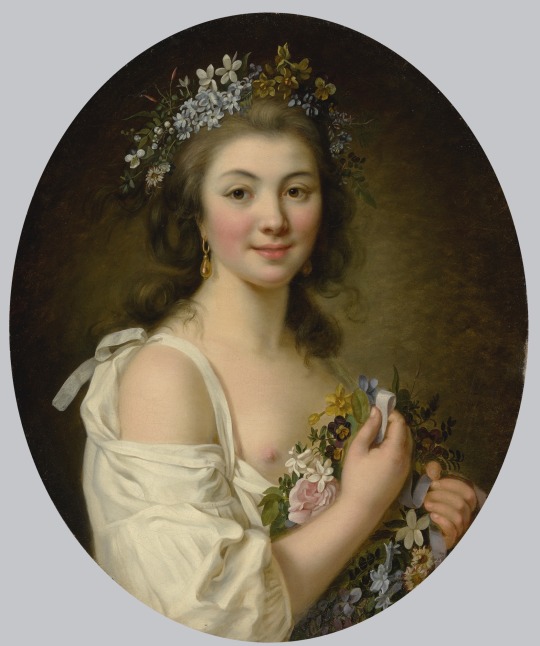
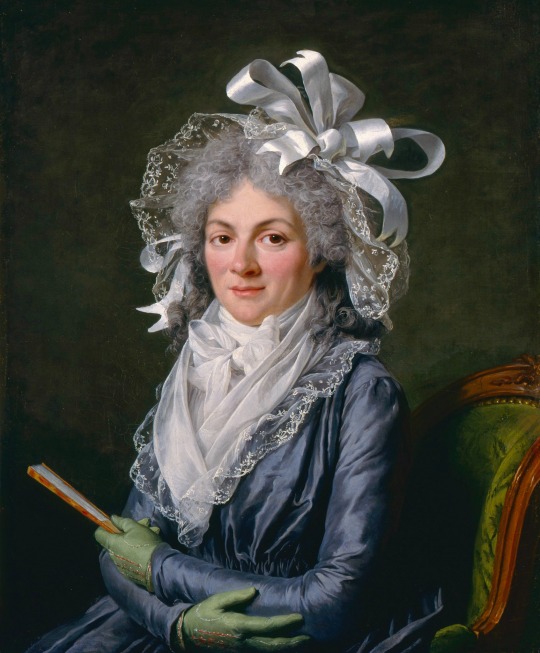
Stéphanie Félicité, Marquise de Sillery, Comtesse de Genlis (25 January 1746 — 31 December 1830)
Madame de Genlis was a French writer who maintained a long correspondence with Napoleon and was on the government’s payroll from 1801 to 1814. There is a lot of debate about the nature of the correspondence. Some contemporaries and historians believe she was Napoleon’s spy.
Lady Morgan asked Madame de Genlis about this:
“Buonaparte,” she said, “was extremely liberal to literary people — a pension of four thousand francs, per annum, was assigned to all authors and gens-de-lettres, whose circumstances admitted of their acceptance of such a gratuity. He gave me, however, six thousand, and a suite of apartments at the Arsenal. As I had never spoken to him, never had any intercourse with him whatever, I was struck with this liberality, and asked him what he expected I should do to merit it? When the question was put to Napoleon, he replied carelessly, ‘Let Madame de Genlis write me a letter once a month.’ As no subject was dictated, I chose literature, but I always abstained from politics.”
Source: France, Lady Morgan, published 1817, p. 360
An outline of her life and career can be read in Destins de Femmes, French Women Writers, 1750-1850 by John Claiborne Isbell, (published 2023).
#Madame de Genlis#Genlis#lady Morgan#Napoleon#napoleon bonaparte#napoleonic era#women writers#first french empire#french empire#women’s history#art#French art#lemoine#Adélaïde Labille-Guiard#Marie-Victoire Lemoine#female writers#1800s#history
51 notes
·
View notes
Note
How do you feel about nation jobs or finances in your universe? Like are modern Matt or Alfred on government payroll even if they don’t do anything? I know you’re mentioned that Alfred is better at managing his money than Matt, is he rich??
Sorry I’m not phrasing this very well 😅
This is somewhat esoteric even for me, but I tied their abilities with money to their economic histories.
Alfred was born looking pretty pathetic next to the Spanish possessions in Mexico and South America or even British holdings in the Caribbean but, in short order, made up a significant percentage of the ships, people, and wealth of the British Empire. He became that on what was primarily the efforts of private enterprise. Alfred grows up understanding he is valuable; he represents value, and his choices create value. He's easy to love because he's a goddamn cash cow for Arthur until the Seven Years War when Britain spent a shit ton and wanted the Yanks to pay their share, and we threw a bitch fit and declared independence.
Matt, however, has the French bitching about what a money hole he is from about 20 minutes after he comes into being. The Basque, by far, made the most money initially with their fishing and whaling in the east, following what was reasonably similar to the Viking routes into Newfoundland. The fur trade that drove French settlement faced collapse about a half dozen times in his childhood, and besides a short binge economy for Ginseng and its brief boom in China, his entire existence was just fur. Dead beavers and the black market. That's it.
While the US was building ships, growing cash crops, running a fur trade economy, engaging in fishing, rope making, pitch collection, barrel making and everything and anything else, in the Caribbean, they had 90+ control over sugar production and trade routes. Canada had 10% of the population and thus 10% of the market power. We didn't do shit except freeze, fire at the British, commit war crimes against the New Englanders, ditch the farms and run off to the west to make families with indigenous women and run furs up the rivers to the point that France tried to make it illegal for people to leave the settlements of Quebec City and Montreal without permission.
So from a relatively early point, Alfred is very smart with his investments, and he's been making his investments since the early 19th century, so there's a significant but often catastrophically destroyed habit of investing. When he was younger and incredibly newly independent, he got fleeced a few times, but he's called smart and secure, especially since the 1929 crash. It's not remarkably large amounts of money because he'll never completely trust the government, and he doesn't want to attract attention or pay massive amounts of taxes, so he's very well diversified. But he's certainly not poor. All his more expensive hobbies come from a particular office in the state department that Alfred sometimes cooperates with and sometimes doesn't, depending on how anti-establishment he and the public feel.
As for Matt, having spent a lot longer as a colonial subject, it's not that he's entirely shit with money but what he knew how to do. The heart of the empire was the financial hub and was outside his control long after even the Confederation in the 1860s. The money situation has been a nightmare since the earliest days of the French Regime using playing cards to pay people. Colonial America had some similar issues. The whole concept of the US dollar originated in the 1690 invasion of Quebec when the Massachusetts Bay Colony printed its own money to fund the expedition, but Alexander Hamilton did some flash economic magic for the US in this department in the 1790s, so it got its shit together long before Canada. Matt knows what he needs to know. He was stationed in various Canadian ports, keeping an eye on his father's investments, not his own.
So, in the modern day, Alfred reads his bank statements every month, keeps track of his subscriptions and bills, and probably has an accountant. Matt is more aware of Alfred's money habits than his own. Because he's over here just kind of vaguely wondering if his debit card will work because my man cannot make heads or tails of his economy (no, seriously, Canadian economists have no idea how Canada's own shit works. Sometimes it's pretty fascinating, there's often no real consensus like the US academic economist have.) And international investors in Canada are always freaking out because the Canadian economy is always getting its shit rocked by the US economy. It's hilarious to think of people in Matt's life frustratedly trying to figure out where and what his money's doing. If their health is tied to their economies, Matt's in pretty good shape, thanks to close ties to the US, but he's randomly dying reasonably often because the US economy's tiny little ripples will randomly tear him apart. It's pretty funny (laughs so I don't sob in the Canadian job market.)
And that's pretty fitting, considering that most Canadian economic policy is boiled down to 'hope the Americans are feeling cooperative next time NAFTA comes up for debate.'
#the ask box || probis pateo#Alfred and Matt || lonely boys with the longest borders#Alfred || o beautiful for spacious skies#Matthew || my country is winter#meatsack mechanics || the sociology and biology of nations
65 notes
·
View notes
Text
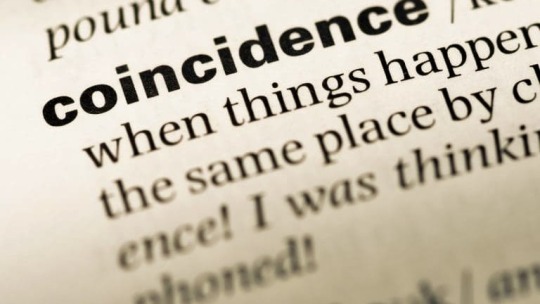
On this day:
CONNECTED
On September 14, 1966, two British sisters visiting New York City for the first time queued up at the airport for over an hour to get a taxi. Amazingly, as they got in the cab, their driver, a complete stranger, asked them about their actor cousin, Guy Middleton, who had performed in New York thirty years earlier. The cabbie used to take him to and from the theater nightly. The girls had spoken to Middleton two days earlier as they were leaving London, and he had asked them to say hello to New York for him; he had many good friends there.
In September, 1891, Dr. Amie Guinard, a surgeon in Paris, France, awoke with a stabbing toothache and decided to get up to finish a paper he was writing on the surgical treatment of stomach cancer. In the morning he went to the dentist down the street, whom he had met once, six months earlier. When Guinard entered the clinic, the surprised dentist told Guinard that he had spent all the previous night dreaming of him. Guinard hoped they were pleasant dreams, but no; the dentist had dreamed that he had cancer of the stomach and that Guinard was going to operate.
In 1967, Constable Peter Moscardi of Essex, U.K., gave his phone number to a friend. But he had accidentally got a number wrong and was unable to get in touch with the friend to change it. Nights later, Moscardi was in the industrial park and noticed a factory door open and a light on inside. As he entered, the telephone rang, and Moscardi answered it. It was his friend calling the wrong number to speak with Moscardi.
In 1992, in Dover, England, a woman, looking at a staff list, mistakenly called her coworker by dialing his payroll identification number instead of his home phone number. He answered, shocked that she had found him; he had been shopping, and the number she had mistakenly dialed turned out to be the number of the payphone he happened to be standing by at that moment.
Text from: Almanac of the Infamous, the Incredible, and the Ignored by Juanita Rose Violins, published by Weiser Books, 2009
6 notes
·
View notes
Note
You’ve probably already answered this, but I’m super curious
What’s Mafia!Charles’ relationship like with the authorities??? Do the police know about him at all?? Are they too scared to go after him???
And what the fuck is their plan if they DO come after them, because then everyone (Max, Arthur, anyone even mildly related) would also take a hit??
Hi anon, ☺️💕
The police in Monaco definitely know who Charles is and what he does. Even the king is aware, he mentioned it to Max in An Angel in the Dark when he encouraged him to stay in Monaco to work.
In other countries, though, it’s not as simple. That’s why Charles always travels privately. Of course, they’ve got some police contacts on their payroll, especially along the Europe coasts to handle shipments. A good example of this is in Chapter 14 (Deliver Us from Evil), when Charles is flying to France and mentions the police are aware of the operation.
But in London, it’s a completely different story. As mentioned in Chapter 32 of the first story (The Light of My Life!), Charles is banned from entering the UK. For me that ban came after he threw a car into the river during a police chase, also referenced in the same chapter.
To be honest, I haven’t really thought about what would happen if the police actually came after him… I have no idea what the plan would be 😳
But that’s such a good question… And now my mind is racing with all the possibilities! 🤭
#ao3 fanfic#beneath the halo#bth#the light within the dark#tlwtd#an angel in the dark#aaitd#anon ask
5 notes
·
View notes
Text
So tomorrow I will have to talk to an entire class of law students about the systematic ban on protests supporting Palestinians by the french authorities. And I have to talk about this for an hour and a half, without getting political somehow, and in a context where lecturers lose their jobs here for speaking out. And I will have to formulate legal-only arguments instead of just saying that the reason of the ban on these protests actually is that this country is allying with a colonizing terrorist entity because first of all it's consistent with France's past as a colonizer, secondly because France is literally on US payroll and thirdly because the common belief here is that arabs are the scum of the earth. And somehow I have to talk about this issue without saying all that. Wish me luck my career in uni is about to be over
14 notes
·
View notes
Note
To the anon talking about sources and asking why you’re the “laughing stock”:
From everything (My-)MT has said about Melissa’s “break” and the sh*t that’s gone down bts and about the SO, like the title and what Mel wants for Caryl, if she prefers friendship, her source isn’t on the payroll. Her sources have to be working for Mel or Mt wouldn’t know what happened in GA and in France or what Mel’s opinions are. That’s what makes sense also because MT works in tv. Actors have agents and managers and assistants and others who work for them and MT could know one or more of them.
That’s the real reason why some fans are sh*tting on her. She works in Hollywood which is bad enough on its own to get people jealous and she has connections outside random crew while filming. Everybody who wants fandom clout has to hate that and how popular her blog is. We turn to My-MT because she’s levelheaded and hasn’t leveraged her personal circumstances for more fandom influence. She’s proven her worth. People build themselves up by tearing others down so it doesn’t surprise me that MT is a target. This fandom is so toxic.
I'm kind of hijacking your ask just to say that I appreciate having the space to go beyond the scope of what we see onscreen or online and to talk about things that get very complicated sometimes, not things that can be attributed to my state of mind i.e. positivity vs negativity. I can't share hard evidence of anything, which I think many people take issue with, but I share what I learn from the connections I've made hoping that it leads to more support for Melissa and for ourselves as fans so we can all have the show of our dreams. Not everything's straightforward and not everything's set in stone. Letting AMC know what we're thinking and feeling helps them see what's working, what's not working, what changes need to be made, and what strategies need to be taken for us to invest in their shows.
7 notes
·
View notes
Text
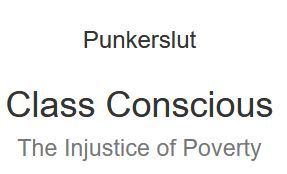

Section II: The Real Distribution of Wealth
The question should be put thus: Is competition a means of ASSURING work to the poor? To put a question of this kind, means to solve it. What does competition mean to workingmen? It is the distribution of work to the highest bidder. A contractor needs a laborer: three apply. “How much do you ask for your work?” “Three francs, I have a wife and children.” “Good, and you?” “Two and a half francs, I have no children, but a wife.” “So much the better, and you?” “Two francs will do for me; I am single.” “You shall have the work.” With this the affair is settled, the bargain is closed. What will become now of the other two proletarians? They will starve, it is to be hoped. But what if they become thieves? Never mind, why have we our police? Or murderers? Well, for them we have the gallows. And the fortunate one of the three; even his victory is only temporary. Let a fourth laborer appear, strong enough to fast one out of every two days; the desire to cut down the wages will be exerted to its fullest extent. A new pariah, perhaps a new recruit for the galleys.... Who would be blind enough not to see that under the reign of free competition the continuous decline of wages necessarily becomes a general law with no exception whatsoever? -- Louis Blanc, 1840 [982]
Before imagining what a society would be like in a Communist economy, a just understanding of a Capitalism economy is in order. It may be true that we understand the mechanics that control a Capitalist economy, such as class war, subsistence wages, competition, and the like. But, in our modern economy, just how much wealth that is produced goes in to the pockets of the Capitalist class, and how much into the pockets of the Proletariat class? To understand the nature of creating a Communist economy out of our current Capitalist society, we must understand the wealth distribution as it exists today. I shall answer those questions here.
Essentially, we are looking for is what economics refers to as an opportunity cost value. It is a difficult number to pinpoint. What does society lose when capitalists of the retail industry compete with each other? First, it requires greater manpower to supply the needs of all store-owners. By having a multiplicity of shops that all dispense the same products, each one only fulfilling a very small amount of its full operating potential, society has lost a certain amount of land and labor. If society were to collectivize the means of production in a manner that benefits the people, by centralizing distribution centers to their maximum potential, then the people would have that additional labor and land at their disposal. It is an inexact value lost by a profit-driven economy over a people-driven economy, as they each measure value differently.
In 2005 in the United States, workers received $7 trillion in compensation. [983] The gross domestic product for personal consumption expenditures was $8.7 trillion. [984] Even if the wage earners spent every dollar they had earned, there was still $1.7 trillion spent on personal consumption. This gives us a minor indication of the immediate differences between those who labor and those who earn a living by possessing property. If we were to absolve the economy of the trees that bore no fruit, we would see the loss of real estate, legal services, management, and administrative industries, relieving the total payroll of $1.17 trillion in payroll. [985] Laborers of the retail and wholesale trades, the assistants and servants of the capital-owning class, provide no value in their services, and would also be removed from that economic position, granting $0.85 trillion in payroll. [986] The finance and insurance industry, which provides no value except to those who own and control the industry, grants its employees $0.53 trillion in payroll. [987] This brings the total of useless industries to $2.55 trillion in payroll. Certainly an economy must possess the means and methods to distribute products to the community; the present industry remains so bulbous from its intention. It does not seek to serve the people, but to gather a profit. Wholesale trade, for instance, does not deliver the product to the end consumer. It only places the product of the mines, factories, and farms into the hands of another who must then distribute it themselves. The role of those employed in this industry is to increase sales. The economy still retains its transportation and warehousing industries, sufficient to the purpose of this industry. Abolishing these useless industries would relieve the payroll costs of $2.55 trillion. Each person’s wages increase by the difference, with the new, unused labor market joining a meaningful area of production. This, along with granting all profit to the worker, would give them a value of $8.7 trillion instead of $4.47 trillion.
The idea of eliminating useless industry as a means to improving the economy is not a new one. By increasing the wages and improving working and living conditions, many of the repelling aspects of laboring are removed. Where the population enjoys the benefits of its economy, there will be many more willing to contribute their efforts and toils to producing the social product. In his book Utopia, Thomas More entails a plan where the idleness of both wealth and poverty are removed...
... then consider the great company of idle priests, and of those that are called religious men; add to these all rich men, chiefly those that have estates in land, who are called noblemen and gentlemen, together with their families, made up of idle persons, that are kept more for show than use; add to these, all those strong and lusty beggars, that go about pretending some disease, in excuse for their begging; and upon the whole account you will find that the number of those by whose labors mankind is supplied, is much less than you perhaps imagined. Then consider how few of those that work are employed in labors that are of real service; for we who measure all things by money, give rise to many trades that are both vain and superfluous, and serve only to support riot and luxury. For if those who work were employed only in such things as the conveniences of life require, there would be such an abundance of them that the prices of them would so sink that tradesmen could not be maintained by their gains; if all those who labor about useless things were set to more profitable employments, and if all they that languish out their lives in sloth and idleness, every one of whom consumes as much as any two of the men that are at work, were forced to labor, you may easily imagine that a small proportion of time would serve for doing all that is either necessary, profitable, or pleasant to mankind, especially while pleasure is kept within its due bounds. [...] And thus from the great numbers among them that are neither suffered to be idle, nor to be employed in any fruitless labor, you may easily make the estimate how much may be done in those few hours in which they are obliged to labor. [988]
Some may argue with me on the matter of removing the retail trade industry. Naturally, every economy must possess a method of distribution for the social product. If we were to keep the retail trade outlets, it would mean keeping the value of stores at the cost of a payroll at $0.467 trillion, for 2005. But, it certainly can be agreed that wholesale trade provides no value; it acts solely as a middleman merchant between vendors of products and those who produce them. Their total payroll for 2005 was $0.389 trillion in 2005. The mechanics of the economy direct and coordinate labor and capital in a manner that increases the labor of all, so that the capital-owning class can possess their profits. Not only does its losses allow for an idle group of owners and lords, but its inefficiency costs the whole of society a great deal collectively. If it can be given that an entire sector of a trade industry produces no fruit that is consumed by the public, then there is certainly a great deal of maximizing efficiency that can go on in the retail trade industry. There must be a reorganization of labor and industry according to the needs and direction of society. It is not simply a matter of giving the profit of the capitalist to the worker; but it is a matter of giving the right to the direction of the economy. Otherwise, the worker does not truly possess a right to collective ownership of the means of production.
Relieving the economy of the employees who provide no value would naturally output itself as unemployment, but in a Socialist economy, where capital is organized according to the interests of labor, it would simply reduce the amount of labor applied to the industry. The equation could be written another way. Instead of reducing the amount of workers employed in fruitless industry, those workers would migrate to useful and productive industry. In this case, laborers would receive the same pay, but with a significant reduction in the amount of time and effort necessary to achieve the final, social product. For instance, the $4.2 trillion difference of $8.7 trillion could be expressed as a 48% reduction in labor to create the same product, or it could be written as a 93% increase in payroll for the laboring class. In either case, it’s a matter of socialization of the economy and capital in order to provide for the people’s needs as they themselves desire. It should be enough for the economy to become socialized. Not only must it organize to eliminate non-value producing industries, but it should fairly distribute the social product to those who produced it. The numbers above provide a small sampling of the type of reorganizing that would happen. The greatest obstacles to a relationship between labor and those possessing the means of production are poor working conditions, low pay, and long hours, the results of a profit-driven economy. These minimal estimates are based on the present working model of the Capitalist system. It would be impossible to achieve an accurate figure of the complete value lost by the exchanges of Capitalism and the advantages of collectivizing the means of production, but these numbers are a start.
One of the primary arguments against such a collectivization of the means of production is that industry would lose its lords and masters. Without the merchants and traders of real estate, legal services, management, and administrative labor, the conflicting units of society would need to work together on mutual, associative, and free relationships in order to receive their subsistence of living. The farmer would need to rely on the steel worker for his tools, just as the engineer must rely on the farmer for his daily sustenance. Without masters of economy, these groups would be required to exchange the products of their economy on the basis of achieving the mutual interest of all parties.
#class consciousness#capitalism#class#class struggle#communism#civilization#money#classism#anti capitalism#anti classism#consumption#economics#industrial society#poverty#workers#labor#anarchism#anarchy#anarchist society#practical anarchy#practical anarchism#resistance#autonomy#revolution#anti capitalist#late stage capitalism#daily posts#libraries#leftism#social issues
2 notes
·
View notes
Text
HOLY SHIT I REALIZED I NEVER POSTED MY NEW OCS HERE!! Buckle up and get ready for a bunch of biblical bullshit, here's my Hellverse OCs!
The gist of the Hellverse is that Heaven and Hell are at war, and a human man by the name of John L'amour gets caught up in it when he causes an angel to sin and thus become a demon.
Warning for mentons of Age Gap but otherwise not much else! (A VERY LONG OC LOREDUMP)
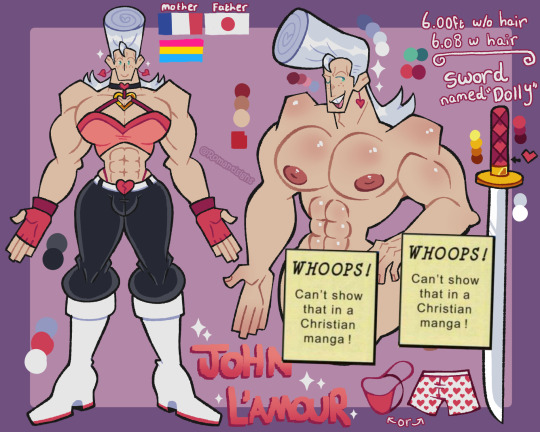
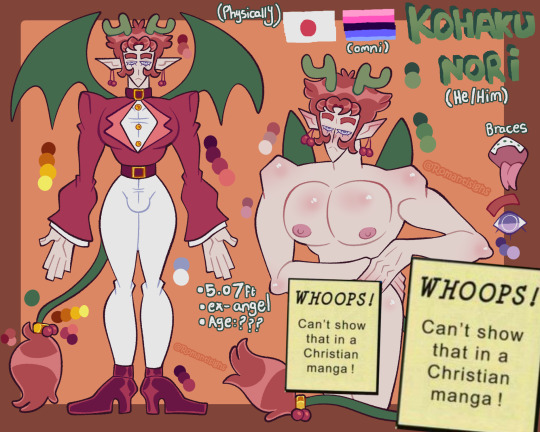
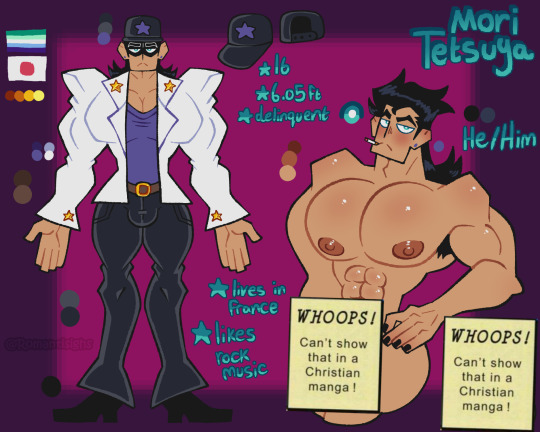
John L'amour | Kohaku Nori | Mori Tetsuya
The main protags of Hellverse, and a rather interesting love triangle. John, a hopeless romantic who failed in all matters of love... until he happened to meet his Guardian Angel and fall for him. During a night of drunken mistakes, he presumes the Angel to be all in his mind... and convinces him to sin.
Such a thing strips Kohaku of his innocence and leaves him a demon, to which John regrets and vows to make amends for. Going to hell to rescue Kohaku, he's allowed to come and go as he pleases so long as he joins the war for Hell. He agrees, and Kohaku has long since forgiven him... as he couldn't imagine a world without John, and was happy to cast Heaven away if it meant being with him.
Tetsuya on the other hand met John in a different happenstance. It was when Tetsuya first moved to France, where the story takes place, and struggled with speaking French in a marketplace. John happened to run into him and helped him out, earning him the thanks of Tetsuya's parents and brother, who offered him dinner as thanks.
Accepting, he was also offered the job of tutor to Tetsuya... though Tetsuya may have other intentions in mind when taking his oral exams...
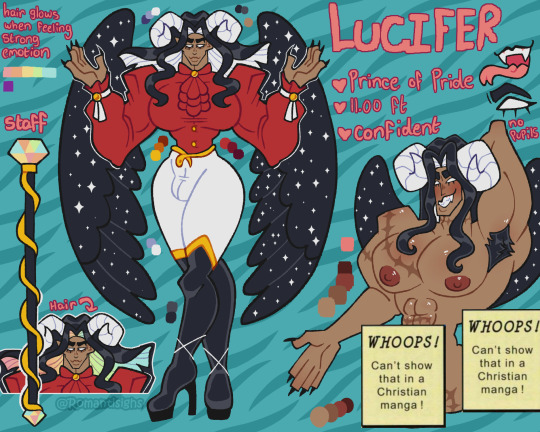
First up, we have Lucifer. The morningstar. The one cast down from heaven for daring to want to be as loved as mankind. Upon being cast down from Heaven by Michael, he found himself in what would become Hell... surrounded by six others. Demons. His brothers.
A proud, confident king who remains vengeful towards Heaven and one day will conquer it. By any means.
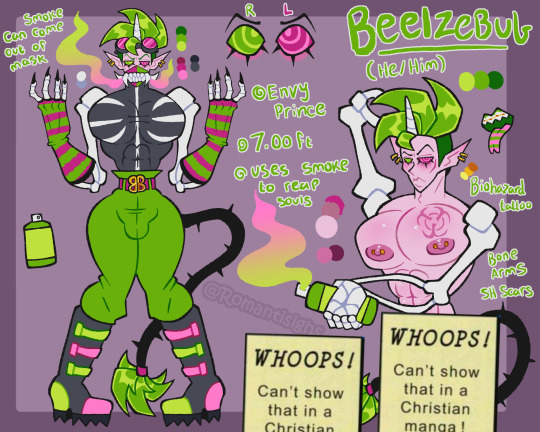
Beelzebub, Prince of Envy. The one in charge of bringing souls to hell, acting as the grim reaper and beacon of his deadly sin. As second oldest in Hell, he's envious of Lucifer and suffers from a mighty inferiority complex.
He can reap souls through his smoke, and even 'tag' houses of the living for later death.
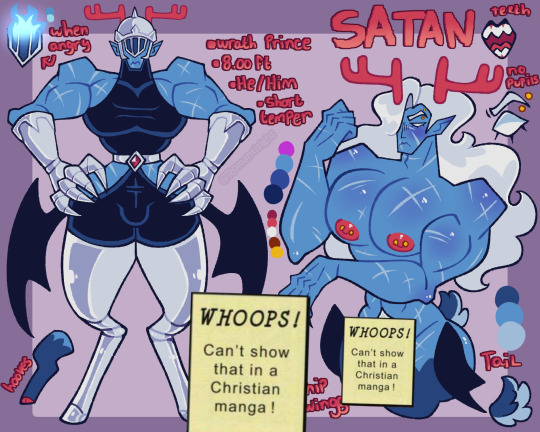
Satan, Prince of Wrath. A stern, short tempered Prince who acts as Hell's resident war strategist and general. He commands his army with a (literal) iron fist, caring not for anything but the art of war. He is as single minded on the war for Heaven as Lucifer, but perhaps more so.
He is often considered beautiful, but compliments and vanity do nothing for him.
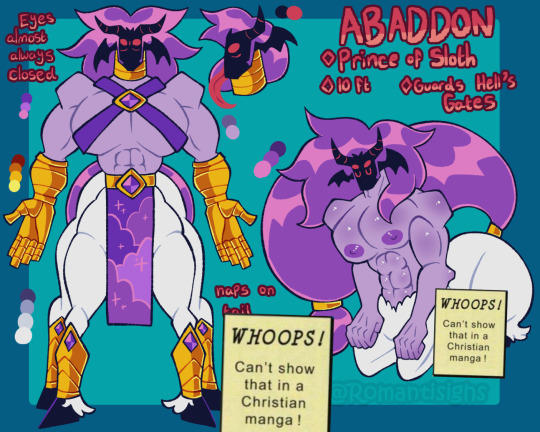
Abaddon, Prince of Sloth. The one that guards the Gates of Hell, thus sapping all his energy and leaving him exhausted and tired. Rarely moves unless absolutely needed. A pacifist who wants the war to be over and done with, though fights alongside his brothers as he is extremely loyal. Will see goals through.
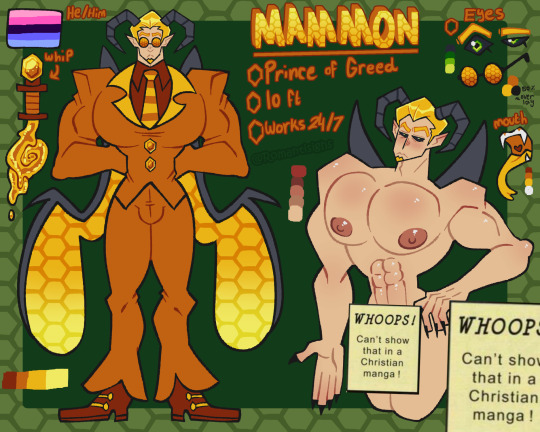
Mammon, Prince of Greed. Runs the Greed Ring of Hell like Wall Street on steroids. Every demon under his payroll is efficient or is struck from existence. Perfection is demanded at all times. He indulges in the finer things in life and those fine things alone, luxury being his top priority. A serial workaholic. Speaks with a German accent.
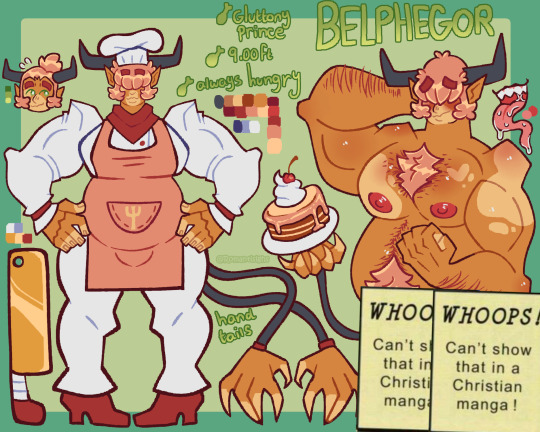
Belphegor, Prince of Gluttony. A kind and enthusiastic cook who runs his ring of Hell like a restaurant, always hungry and always eager to share the delights of food with everyone. Feeds the other rings of Hell and is always out to try new foods. Sweet, not a fighter, though he is known to help butcher as well. Speaks with a French Accent. Very singleminded towards cooking.

Asmodeus, Prince of Lust. The youngest prince and the most bubbly. Full of passion and love, always seeing the best out of any situation. His ring is akin to a large burlesque parlor, providing entertainment and relaxation for the others. He has a fondness for Mammon, always wishing to help him relax and take a break... to no avail.
A victim of hopeless romance and puppy love more than not, but absolutely revels in intimacy. Sees sex as but one ultimate way to connect two or more souls together.
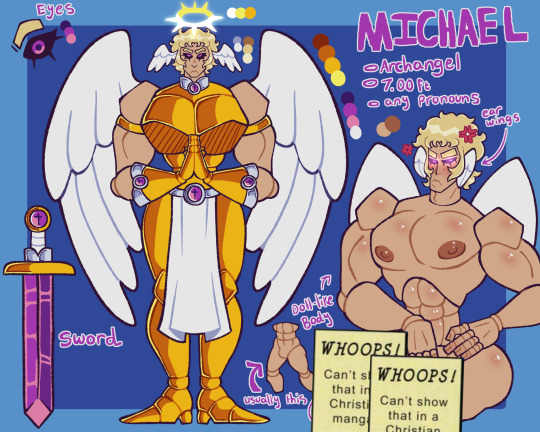
AND WE CAN'T FORGET MICHAEL, THE ONE TO CAST DOWN LUCIFER!
Though sworn to Heaven with undying loyalty, he has a... fondness... for Lucifer. Not that he'd admit it. Heaven's word comes first and foremost, even if Lucifer's sin tempts him. That's the point of sin, and the point of remaining virtuous...
#Hellverse AU#oc#original character#demon oc#cw age gap#oc lore#reference sheet#seven deadly sins#proship safe#antis dni
3 notes
·
View notes
Text
French hive is hilarious. Here’s some advertisement that they created for “Renaissance: A Film by Beyoncé”, in France. Put them on the payroll Parkwood. 💅🏽😂🤣😩
🎥: evvanange / tiktok
#beyoncé#beyonce#beyonce giselle knowles#yoncé#queen bey#beyhive#fashion#renaissance world tour#renaissance#renaissance album#club renaissance#renaissance film#beyonce renaissance#amc theaters#movie theater
13 notes
·
View notes